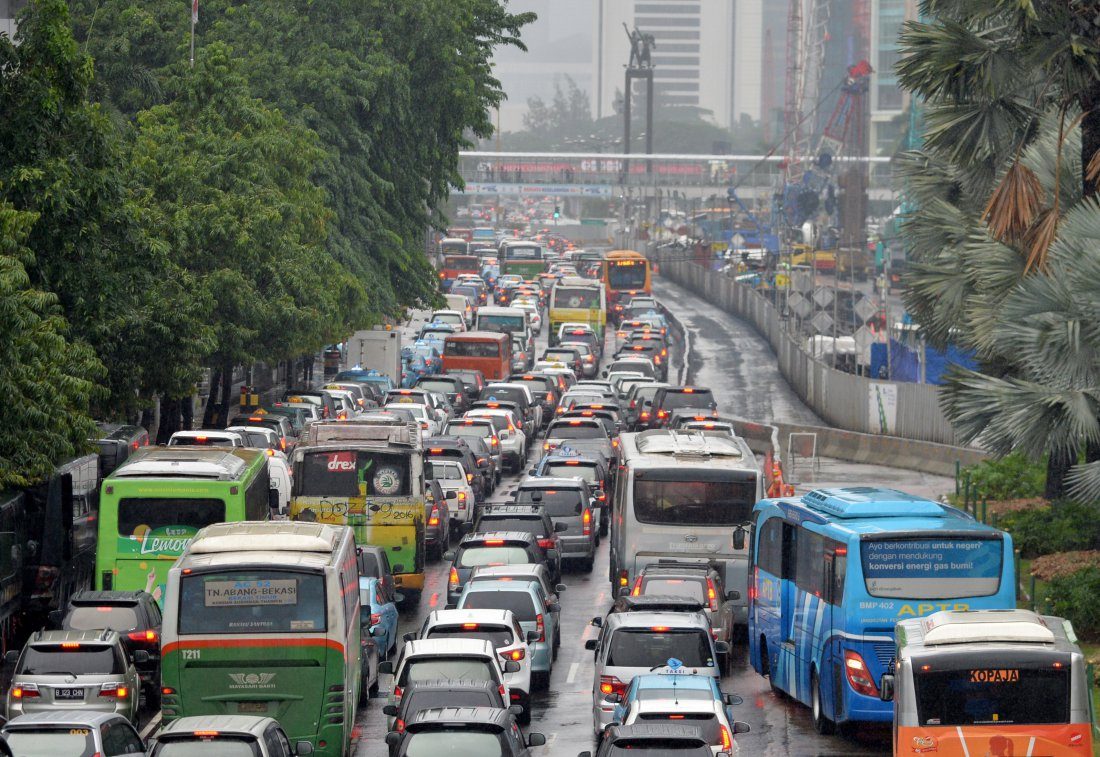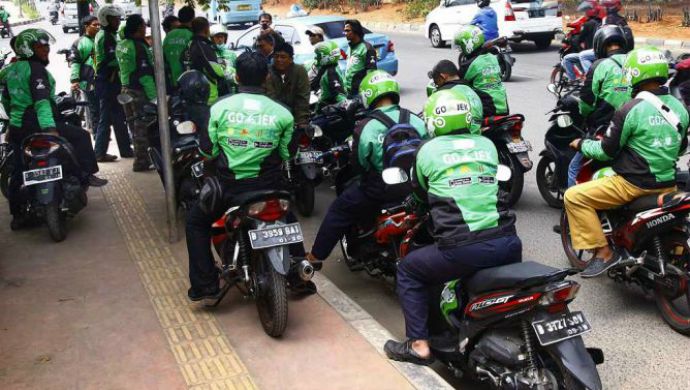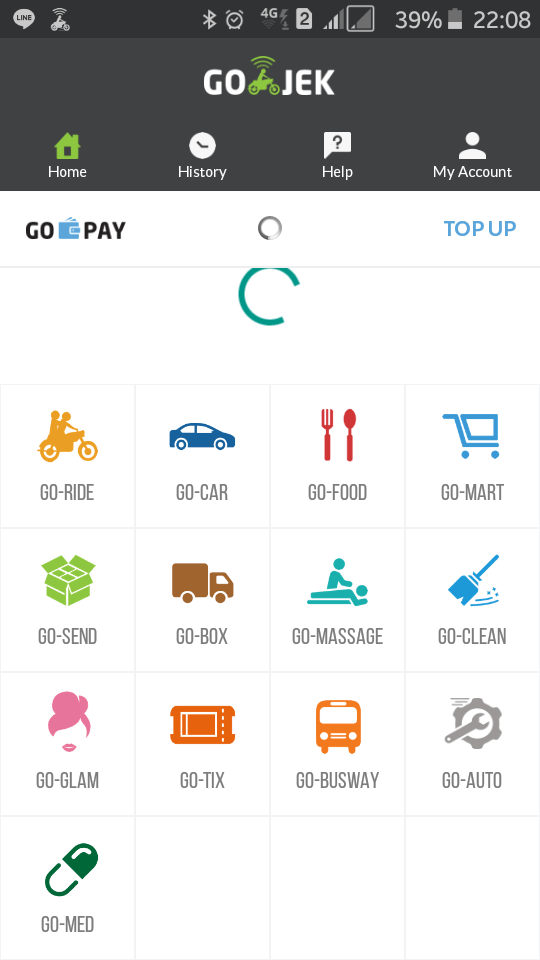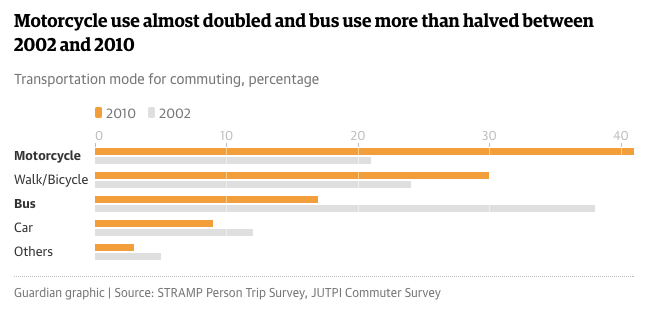Go-Jek: Lovechild between TaskRabbit and Uber

 This picture taken on January 20, 2015 shows a gridlock in Jakarta’s main road. Jakarta has just won the distinction of having the worlds worst traffic, according to a recent index. (BAY ISMOYO/AFP/Getty Images)
This picture taken on January 20, 2015 shows a gridlock in Jakarta’s main road. Jakarta has just won the distinction of having the worlds worst traffic, according to a recent index. (BAY ISMOYO/AFP/Getty Images)
Jakarta was chosen as the city with the worst traffic by TomTom Navigation who used its satellite navigation data to determine the number of times a car started and stopped per kilometer, then multiplied it by the average annual driving distance in the country. Relying on information from TomTom devices in 78 countries, the next worst cities for traffic jams are Istanbul, Turkey; Mexico City, Mexico; Surabaya, Indonesia; and St. Petersburg, Russia. No American cities appeared in the top ten. [1]
As Greater Jakarta’s population expected to raise from 30 million today to more than 40 million by 2040, wasting hours stuck in traffic looks like to be a more of a daily frustration for its residents. As the last biggest metropolitan in Asia without metro, is Jakarta destined to be jammed forever?
“(Due to traffic jam) motorbikes are twice the speed of a car in Jakarta, they use a 10th of the fuel, are a 10th of the cost and use far less space,” says Nadiem Makarim HBS 2011), founder and CEO of Go-Jek, the city’s two-wheeled version of Uber. “Motorbikes are much more efficient. There’s no reason for cars to exist in this city at all.”
Freelance motorcycle taxi driver, Ojek, already existed as early as 1969 in Indonesia. [2] Nevertheless, this informal economy sector was mature, highly disintegrated, and mostly used by those at the bottom of the pyramid. The service was very user unfriendly where price discrepancies and rider security are main key issues. Nadiem founded Go-Jek in 2010 to make the ojek riding experience seamless, but the company only took off in January 2015, when they first launched the Android app to replace its call center booking system.

 Since then, Go-Jek app has been downloaded 25 million times. The company continue to add informal businesses onto its platform. Not only getting around the city, but its app users also can get a massage therapist or a house cleaner come to their door within 90 minutes. Go-Jek’s food delivery business is now Asia’s largest outside China and Go-Jek also offers hairstylist, theatre tickets, flowers, and prescription medicines. Go-Jek is literally the lovechild between TaskRabbit and Uber on steroid. [3]
Since then, Go-Jek app has been downloaded 25 million times. The company continue to add informal businesses onto its platform. Not only getting around the city, but its app users also can get a massage therapist or a house cleaner come to their door within 90 minutes. Go-Jek’s food delivery business is now Asia’s largest outside China and Go-Jek also offers hairstylist, theatre tickets, flowers, and prescription medicines. Go-Jek is literally the lovechild between TaskRabbit and Uber on steroid. [3]
“It’s pretty hard to find something you can’t get by motorbike delivery,” says Makarim. “You don’t need to waste time in traffic to get what you want. We bring everything to you. If you didn’t want to you wouldn’t have to leave your apartment.”
Go-Jek raised $550 million in new funding, that values the strartup at $1.3 billion (post-money). The money was provided by new investors KKR, Warburg Pincus, Farallon Capital and Capital Group Private Markets. Existing investors Sequoia India, Northstar Group, DST Global, and NSI Ventures are also take part. The deal makes Go-Jek one of the few unicorns in Southeast Asia. Others tech companies valued more than $1 billion include games firm Garena ($3.75 billion), Uber rival Grab (estimated $1.5 billion-$1.6 billion) and Rocket Company’s Amazon-esque Lazada ($1.5 billion valuation). [4]
Go-Jek’s strategy to roll up all informal services into its platform is key to increase its user stickiness. Combined with their recently launched loyalty program, they hope to prevent the user from multihoming. Nevertheless, multihoming is rampant on its service provider side, as switching cost is almost zero. With VC funding on its back, Go-Jek announced that they are ready to bleed as they subsidize their informal service providers on each order.
- http://time.com/3695068/worst-cities-traffic-jams/
- http://historia.id/kota/mengorek-sejarah-ojek
- https://www.theguardian.com/cities/2016/nov/23/world-worst-traffic-jakarta-alternative
- https://techcrunch.com/2016/08/04/indonesias-go-jek-raises-550-million-to-battle-uber-and-grab/




I used to visit Jakarta almost three time a year when I was doing business before coming to HBS. For sure that city has the worst traffic. I remember I can make only 1 appointment in the morning and at most 2 meetings in the afternoon due to too-heavy traffic. Once I seriously considered using Ojek when I almost missed my flight due to heavy traffic.
As you said the business has zero switching cost and multi-homing seems inevitable but this emergent service will greatly improve the quality of life of Jakarta citizens for sure. I am usually hesitant to ride on a bike but I would consider if I can reduce several hours of being stuck on the road.
Thanks Gary for the post! I completely agree with Tomo on the level of traffic in Jakarta – it is mad!
I appreciate your comments on how Go-Jek is adding features to increase the stickiness of its users, however do you feel there is anything they are actively doing to increase the stickiness of the third party vendors who are adding their services to the platform to attract these users? More specifically is there anything they are doing to minimize the multihoming of their vendors who are selling to the users through the platform? If this business simply requires a few motorbikes and app connection to restaurants etc – it seems fairly simple for a competitor to enter and mimic. Other than ‘bleeding money’ – is there anything Go-Jek can do or is doing to ensure they maintain the market leader position from both a user and vendor side?
Great example of localization Gary.
Given the size of the market in Indonesia, it looks like a great base upon which to build out this business in other similar grid-locked and motorcycle heavy cities in SE-Asia (thinking of places like Vietnam, Thailand). Multi-homing and ease of market entry are huge challenges as listed above, but I wonder if SE-Asia is a place where more regulatory barriers through partnership with governments could be an attractive strategy to prevent foreign entrants? Could a trend towards nationalism help Go-Jek?